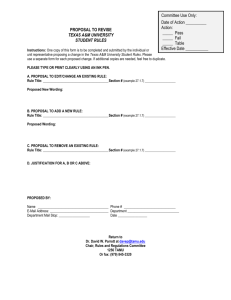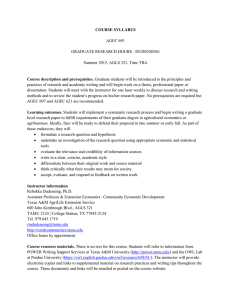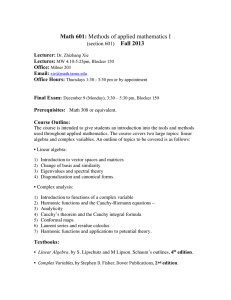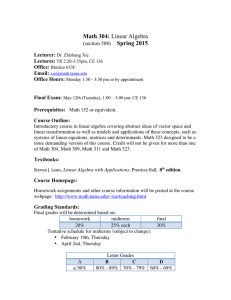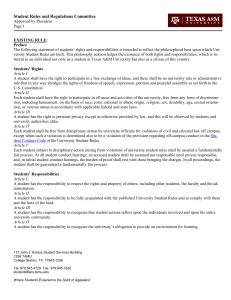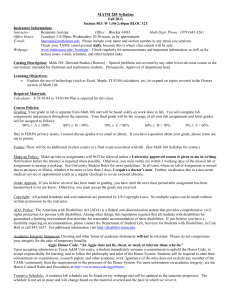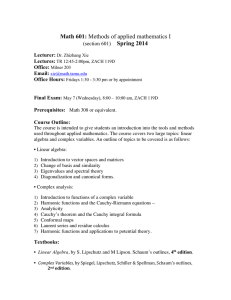COURSE SYLLABUS Course description and prerequisites. AGEC 691
advertisement
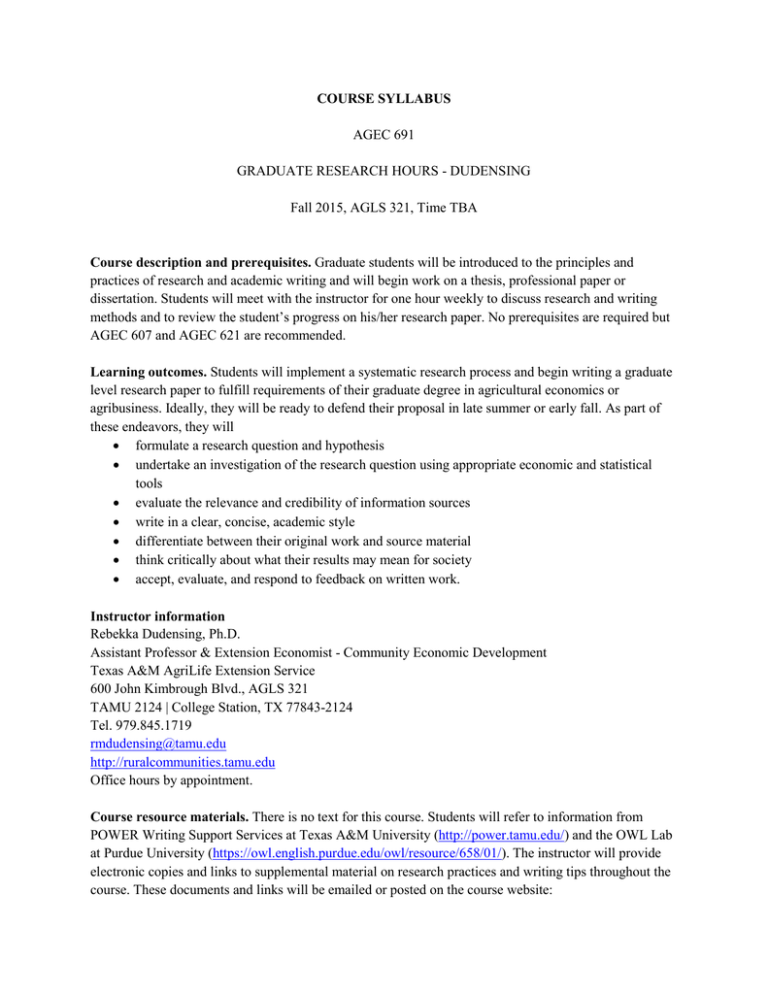
COURSE SYLLABUS AGEC 691 GRADUATE RESEARCH HOURS - DUDENSING Fall 2015, AGLS 321, Time TBA Course description and prerequisites. Graduate students will be introduced to the principles and practices of research and academic writing and will begin work on a thesis, professional paper or dissertation. Students will meet with the instructor for one hour weekly to discuss research and writing methods and to review the student’s progress on his/her research paper. No prerequisites are required but AGEC 607 and AGEC 621 are recommended. Learning outcomes. Students will implement a systematic research process and begin writing a graduate level research paper to fulfill requirements of their graduate degree in agricultural economics or agribusiness. Ideally, they will be ready to defend their proposal in late summer or early fall. As part of these endeavors, they will • formulate a research question and hypothesis • undertake an investigation of the research question using appropriate economic and statistical tools • evaluate the relevance and credibility of information sources • write in a clear, concise, academic style • differentiate between their original work and source material • think critically about what their results may mean for society • accept, evaluate, and respond to feedback on written work. Instructor information Rebekka Dudensing, Ph.D. Assistant Professor & Extension Economist - Community Economic Development Texas A&M AgriLife Extension Service 600 John Kimbrough Blvd., AGLS 321 TAMU 2124 | College Station, TX 77843-2124 Tel. 979.845.1719 rmdudensing@tamu.edu http://ruralcommunities.tamu.edu Office hours by appointment. Course resource materials. There is no text for this course. Students will refer to information from POWER Writing Support Services at Texas A&M University (http://power.tamu.edu/) and the OWL Lab at Purdue University (https://owl.english.purdue.edu/owl/resource/658/01/). The instructor will provide electronic copies and links to supplemental material on research practices and writing tips throughout the course. These documents and links will be emailed or posted on the course website: http://agrilife.org/agecoext/programs/community-programs/rural-communities/agec-291691-researchresources/, also accessible from the http://ruralcommunities.tamu.edu website. Students are expected to be familiar with and adhere to the university thesis and dissertation requirements (http://ogaps.tamu.edu/Buttons/Resources-for-Degree-Completion#0ThesisandDissertationRequirementsandInformation). Each student will also select and read materials related to his/her specific research project. Grading policies. Course grades are pass/fail and reflect the student’s effort and progress toward fulfilling his/her paper requirement. Attendance and make-up policies. Preparation and attendance at scheduled meetings are paramount to success in a research course. Current drafts of papers are expected 24 hours prior to the scheduled course meeting for that week. Dr. Dudensing’s Extension responsibilities will occasionally necessitate finding an alternate meeting time. She extends the same courtesy to students, as fellow professionals. Please email rmdudensing@tamu.edu as soon as possible when you have a conflict to reschedule a meeting time. Diligent effort between meetings is crucial to success; however, a lack of preparation is not reason to cancel a meeting but rather indicates an immediate need to meet to get back on track. Following two unexcused absences or suspiciously canceled meetings, Dr. Dudensing and the student will meet to discuss communication issues and sign a memorandum documenting future expectations. Continued unexcused absences may result in a failing grade. Course topics, calendar of activities, major assignment dates. See the assignments table under grading policies for assignments and approximate dates. Course topics for weekly one-hour meetings are outlined below. Most time is reserved for discussing the research topic and progress with the student. Specific topics and deadlines are listed below. The timeline may be amended based on data collection. Week of: Topic Assignment Due August 31 Proposal defense. Evaluating the proposal defense and September 7 incorporating feedback. Looking at San Antonio data. Following Review responses from proposal September 14 up with other zoos. defense. September 21 Data analysis, including IMPLAN. Back to the literature review. What could be added? How does the literature jive September 28 with your early results? IMPLAN for S.A. October 5 Updating the methods. October 12 Reporting Results. Updated methods chapter. October 19 Writing the Conclusions. Draft of results chapter to date. October 26 No meeting. November 2 Data Analysis and writing. November 9 Data Analysis and writing. Draft of conclusions chapter. November 16 Data Analysis and writing. Interim draft of full thesis to date. November 23 Data Analysis and writing. Nov 30 - Dec 9 Data Analysis and writing. Final version of full thesis to date. *Assignments are due 24 hours prior to the scheduled course meeting for that week. Professional Development Opportunities Students are strongly encouraged but not required to submit their work to Texas A&M’s Student Research Week (http://srw.tamu.edu/) and similar professional development opportunities. Americans with Disabilities Act (ADA) Policy Statement The Americans with Disabilities Act (ADA) is a federal anti-discrimination statute that provides comprehensive civil rights protection for persons with disabilities. Among other things, this legislation requires that all students with disabilities be guaranteed a learning environment that provides for reasonable accommodation of their disabilities. If you believe you have a disability requiring an accommodation, please contact Disability Services, in Cain Hall, Room B118, or call 845-1637. For additional information visit http://disability.tamu.edu. Academic Integrity Statement and Policy “An Aggie does not lie, cheat or steal, or tolerate those who do.” For more information refer to the Aggie Honor Code website link http://aggiehonor.tamu.edu. Awritingintensive research course generates concern about potential plagiarism (as defined in Section 20.1.2.3.5of the Honor System Rules http://aggiehonor.tamu.edu/RulesAndProcedures/HonorSystemRules.aspx#definitions). In short “The appropriation of another person's ideas, processes, results, or words without giving appropriate credit” (Honor System Rules, accessed May 12, 2015) will not be tolerated. Appropriate citation of materials is an early topic of the course. Software such as TurnItIn may be used to check written work for originality.
